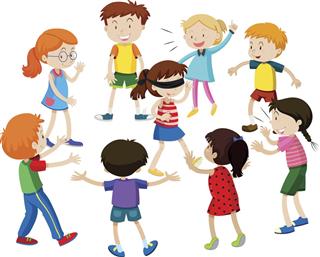
Group therapy is a form of psychotherapy that can prove beneficial for individuals affected by psychological or behavioral problems. This PsycholoGenie article shares some of the fun group therapy game ideas.
The term ‘psychotherapy’ refers to a form of treatment wherein a therapist interacts with the individual affected by a mental health disorder. The therapist attempts to understand the underlying cause of the mental health disorder, and helps the patient comprehend the condition. Also, the therapist helps the affected individual learn effective ways to cope with the disorder/addiction, and respond to challenging situations. In case of group therapy, one or more therapists work with a group of individuals affected by a similar condition or situation. Interaction with others affected by the same problem instills hope in the members of the group, as they feel that they are not alone. This form of social interaction improves the social skills of the members. These days, many psychotherapists are recommending group therapies for people affected by psychological problems. A group healing process brings the sense of belonging amongst patients, which in turn motivates them to overcome their issues and lead a better life.
Group Therapy Activities
Fun group therapy activities allow patients to forget about their own problems. Apart from this, such activities also give them a chance to interact with other people, and realize that they are not the only ones with problems. When the members of the group share their experiences, they are able to learn different ways to cope with their problems in effective ways. Initially, ice breaker games are conducted for obvious reasons. Thereafter, they participate in games that help them establish trust, and increase their self awareness and self-esteem. Group games help patients cope with their behavioral issues as well. It changes their outlook towards life.
Popular Ice Breaker Games
Part and Be a Part
In this game, the group is divided into subgroups, and each member has to come up with unique name for their group. Each member has to explain the reason behind selecting the particular name. This gives the participants a chance to express themselves.
Pim-pom
This is another fun group therapy exercise. The members are asked to form a circle. Then, they need to ask the names of people standing next to them. You have to associate pim with person standing to your right and pom with the person standing to your left. A game conductor or counselor has to go to any person randomly and say pim-pom and participant has to take the name of the person standing to his/her right and left. If the conductor says pom-pim, the member has to take the names of the persons standing to his/her left and right. The members can change their position regularly, so that they get a chance to interact with many people.
Trust-building Games
Blind Fold
This game would help the participants reinforce trust in their relationships. Divide the group into pairs and blindfold one person from each pair. Hand over a chalk to the blindfolded person, and ask the other partner to guide him to draw something meaningful. Once the session is over, ask the participants about the communication, or the problems faced. This would throw light on the importance of trust in relationships.
Dance to Get Closer
This a great music game for individuals affected by emotional problems, or those who have lost faith in relationships. First of all, take a newspaper and spread it across the floor. Ask two people to dance on the paper. After every couple of minutes, the paper should be folded, and the group that steps out of the paper is out of the game. As the newspaper is folded several times, the partners would come closer. Once the session is over, a counselor can ask the participants about how they felt on coming closer.
Insight and Self Awareness Games
Unknown Wish
Ask all the participants to pen down their wishes on a piece of paper, and put it in a box without writing their names. Once all the wishes are collected, tell each person to pick up any piece of paper, and read out the wish as if it was his/her own wish. Ask them how it felt. This game allows all the participants to express their wishes, and find out how others react to it. This game also fosters the sense of empathy for others.
Solve the Knot
In this game, divide the group in smaller groups. Ask them to stand in a circle and hold hands. The members need to form a jumble of knots by lifting and going under the each others’ hands. Now, ask the other group to solve the ‘human knot’ and make a circle again, but while holding hands. By performing this exercise, one group gets a chance to use problem-solving skills, whereas the other group learns the importance of group work and integrity.
The aforementioned group games encourage social interaction, thereby helping the members to share their experiences, and learn to offer and receive support. Group therapy also allows the therapist(s) to observe the behavior of each participant, and come up with strategies that can help the members cope better.
Disclaimer: The information provided in this article is solely for educating the reader. It is not intended to be a substitute for the advice of a medical expert.





